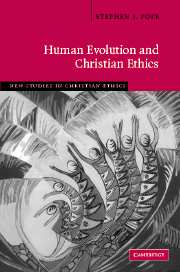Book contents
- Frontmatter
- Contents
- General editor's preface
- Acknowledgments
- Introduction
- Chapter 1 Evolution and religion
- Chapter 2 The indifference of Christian ethics to human evolution
- Chapter 3 Varieties of reductionism
- Chapter 4 Faith, creation, and evolution
- Chapter 5 Chance and purpose in evolution
- Chapter 6 Human nature and human flourishing
- Chapter 7 Freedom and responsibility
- Chapter 8 Human dignity and common descent
- Chapter 9 Christian love and evolutionary altruism
- Chapter 10 The natural roots of morality
- Chapter 11 Natural law in an evolutionary context
- Chapter 12 Sex, marriage, and family
- Bibliography
- Index of scriptural citations
- Index of names and subjects
Chapter 6 - Human nature and human flourishing
Published online by Cambridge University Press: 26 June 2009
- Frontmatter
- Contents
- General editor's preface
- Acknowledgments
- Introduction
- Chapter 1 Evolution and religion
- Chapter 2 The indifference of Christian ethics to human evolution
- Chapter 3 Varieties of reductionism
- Chapter 4 Faith, creation, and evolution
- Chapter 5 Chance and purpose in evolution
- Chapter 6 Human nature and human flourishing
- Chapter 7 Freedom and responsibility
- Chapter 8 Human dignity and common descent
- Chapter 9 Christian love and evolutionary altruism
- Chapter 10 The natural roots of morality
- Chapter 11 Natural law in an evolutionary context
- Chapter 12 Sex, marriage, and family
- Bibliography
- Index of scriptural citations
- Index of names and subjects
Summary
This chapter examines both evolutionary and Christian theological accounts of “human nature,” including its innate, biologically based needs and inclinations. I argue that evolutionary insights into our cognitive, emotional, and social capacities can inform Christian ethical understanding of human flourishing.
Evolutionary psychologists think of human nature as the collection of species-typical goal-directed mechanisms designed by natural selection. These mechanisms constitute a “human nature” that is virtually the same in all “modern” human beings, namely those living in the past 100,000 years or so. Biologists have argued that our “sweet tooth” and our natural craving for fatty foods, for example, reflects our predecessors’ evolutionary adaptation to ecological conditions of periodic scarcity that rewarded maximum consumption and storage of calories in body fat. These dietary proclivities were adaptive for Paleolithic hunter-gatherer bands but they cause well-known health problems for people living in modern developed sedentary societies.
Central among our species-typical evolved inclinations is our need to form personal attachments and to participate in communal life. Evolutionists hold that the human psyche manifests basic conflicts between and among the teachings of culture and the demands of biologically based proclivities. They stress the inner tensions that reside in our emotional constitution as human beings and not only those due to the particularities of our cultures or personal life histories. Konrad Lorenz used the helpful phrase “Parliament of Instincts” to communicate the dynamic interaction between many different and competing motivations in the human psyche.
- Type
- Chapter
- Information
- Human Evolution and Christian Ethics , pp. 129 - 157Publisher: Cambridge University PressPrint publication year: 2007

